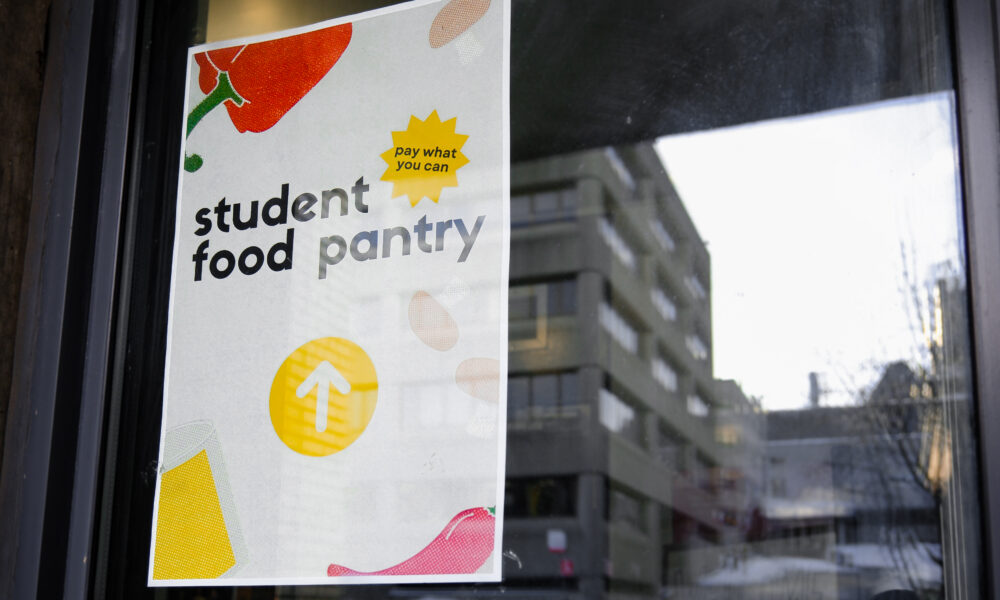The Students’ Society of McGill University (SSMU) recently launched a new pay-what-you-can student food pantry on Jan. 30 to promote greater food security on campus. Planned in partnership with the ECOLE project, a sustainability-focused communal student housing cooperative, the pantry is located in the foyer of the ECOLE building at 3559 Rue University.
This project is just one of several initiatives to battle food insecurity at McGill, an issue student groups—such as McGill Food Coalition, Midnight Kitchen, Student Nutrition Accessibility Club’s (SNAC), and Let’s Eat McGill—claim is prevalent on campus. According to a survey carried out by Let’s Eat McGill in Winter 2023, over 30 per cent of surveyed students went without meals once or twice a month, while over 20 per cent of students went without meals several times a month.
Nika Rovensky, one of the facilitators of ECOLE and the Community Engagement Commissioner at SSMU, manages the SSMU food pantry in partnership with SSMU Vice-President External Affairs, Hugo-Victor Solomon.
Located opposite the Birks Building, the food pantry is open to students 24/7, making it unique compared to other initiatives on campus. In comparison, SSMU’s Grocery Program is available once a semester, and SNAC’s weekly produce distribution operates every Monday from 1 p.m. to 4 p.m.. Similarly, the Midnight Kitchen operates once or twice a week at 1 p.m..
“One really big thing that we wanted to address was the aspect of accessibility, and being able to come get [food] on your own schedule and not being held back by a window of time,” Rovensky said. “That’s why the food bank is refilled once a week but it’s accessible at all times. You don’t need to tap in or anything, you can just open the door and it’s just there.”
Solomon believes that the food pantry is a tangible way to give back to the student community and address the issue of food insecurity.
“This project is squarely in line with mandate 5.1.1 of the SSMU’s Food Security Policy by promoting food sovereignty for the student community while working to ensure more equitable access to food resources,” Solomon wrote in a statement to The Tribune.
The food bank operates on a pay-what-you-can scheme, with signage in the pantry indicating suggested amounts for students to pay. Suggested prices, which can be paid via e-transfer, range from $0.25 CAD for canned items and pasta, to $0.50 CAD for single vegetables, and $1 CAD for everything else.
Innovation Assistance, a community food distribution centre that aims to provide food sovereignty to those who need it in the Peter-McGill area, delivers the food bi-weekly. Micah Angell, the coordinator of Innovation Assistance, explained why the centre collaborated with the food pantry in a written statement to The Tribune.
“Innovation Assistance’s Food Dream desires for the residents of Peter-McGill to have no barriers between them and the food that they want to consume,” Angell wrote. “Being able to help make sure that students facing food insecurity at McGill have access to healthy and local food is a huge win for us and for the neighbourhood.”
SNAC and Midnight Kitchen are also collaborating with the student food pantry, delivering produce and allowing volunteers to restock the pantry every week or several times a week if needed.
Rovensky explained how the food pantry aims to promote sustainability by limiting its food waste
“If there’s food that hasn’t been taken, and it might be going bad, we find a way to repurpose it here,” Rovensky said. “An example of that would be that we had a film screening this past week and there were some extra parsnips [in the pantry] and they made parsnip chips for the film screening for the people that came. So it’s [a] very circular [process].”
Looking to the future of the food pantry, Rovensky and Solomon both hope that the program will continue to grow.
“This is a pilot project and we’re looking to expand it long-term in collaboration with Student Housing and Hospitality […] at McGill, and have a larger space in the University Hall Building,” Rovensky said.









